Victor Hara. The life and death of a free chile singer
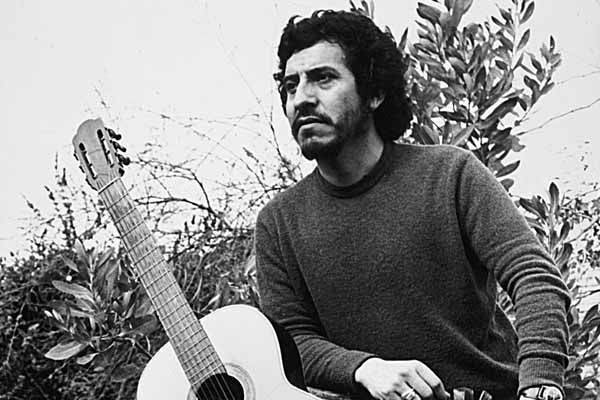
28 September 1932 was born a man who, unfortunately, was destined to become the most famous and significant victim of the Pinochet regime. This is Victor Jara Martinez, the most famous Chilean singer, poet and musician who adhered to political leftist views and was a member of the Communist Party of Chile. 15 September 1973, Mr .. forty-year-old Viktor Hara accepted the death of a martyr at a stadium, which was turned by Pinochet's secret police into a concentration camp for supporters of ousted legitimate President of Chile Salvador Allende. Popular during life, after the death of Victor Hara, he became a real symbol of anti-Pinochet resistance. Perhaps - the third Latin American Communist after Che and Fidel, who achieved such popularity in the world as an iconic figure of the left in the New World.
Childhood peasant son
Victor Hara Martinez was born in a small village of San Ignacio in the Inkilinos family - this is how Chilean peasants were called in Chile, who slaughtered the lands of large landowners. Father Manuel Hara and his wife Amanda Victor were the fourth in a row - after Maria, Georgehina and Eduardo. Both Victor's father and mother worked on the earth from dawn to dusk, but hard work did not bring significant income to the family, and allowed only to get food and somehow to dress. The lands on which Victor's parents worked were owned by the rich landowners Ruiz-Tagle. This surname of land oligarchs supported in their possessions orders comparable to those that existed in feudal Europe. Farmers - farm laborers received a house with a small plot of land and another tiny plot a little further away - in order to be able to grow maize, beans and potatoes on them - the main food of the Chilean poor. In return, the peasants were forced to work for many hours in the fields of the owners, while their earnings were barely enough to buy the necessary goods in the store. More often the goods were taken into debt, which also had to work. Each Incilinos family had to allocate two men to work on the plantations of the latifundista. The women also carried out work on the plantations, but, in addition to this, the entire household was also kept in their large families. Victor Hara Amanda's mother came from the Mapuche Indians and was a very good mistress. At least, that’s what Victor himself told about her. However, the living conditions of the Hara family, despite the fact that my father worked all day, and the mother managed the household as best she could, were difficult. From this, Victor Manuel's father was increasingly applied to the bottle and this, of course, left an imprint on the atmosphere of family relations. Gradually, the interests of the growing Victor focused entirely on music. The first person to introduce him to the guitar was the village teacher, who rented a room in the house of the Hara family. He taught Victor to take the first chords and introduced him to songwriting, becoming a connecting thread with the rich world of Latin American folk culture.
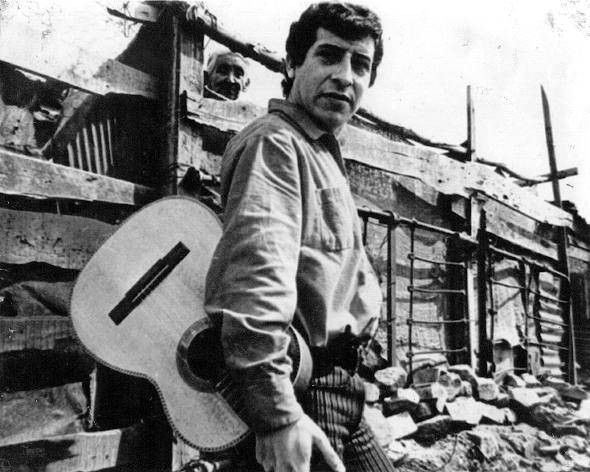
Victor himself was drawn to knowledge - and in this he looked like his mother, who, despite the difficult situation of the farm worker, was literate and wanted her children to get an education. Therefore, Victor, like other children, Amanda Hara placed in school - and this despite the protests of Father Manuel, who saw in children only helpers. Capable Victor quickly became one of the best students in school, and especially he managed to play in small scenes, which were played after the end of the lessons. However, after a misfortune happened in the family - a cauldron of water turned over to the eldest daughter Maria, Amanda and her children moved to the capital of the country, Santiago, closer to the hospital where Maria was treated. Like many other poor peasants who arrived in search of a living and a better life in the capital, Hara settled in the slum settlement of Nogales. It was typical for the Latin American cities "favella" - it is not clear from which houses, dirty narrow alleys, constant drunkenness of adults, youth gangs. Victor and Eduardo were assigned to the Catholic high school Ruiz-Tagle, located next door. Here Victor received his primary education, also distinguished by a high diligence in his studies. Meanwhile, his mother, Amanda, who worked as a cook at one of the local low-cost restaurants, managed to save some money and open her own inn where workers could work as porters. This allowed the family to significantly improve their well-being, although the children still had to help the mother in making money. Next to the new house, where the family moved, there was a wine shop and a young musician Omar Pulgar often performed there. Somehow Victor met him, and Omar became the second, after the village teacher, a man who began to teach the young Hare lessons in playing and singing.
Youth and the beginning of the musical path
After school, Victor continued his studies at a commercial school, where he studied bookkeeping. But, unlike schoolwork, the accountant’s craft was bad for him - he considered him boring and preferred to spend his free time with friends, singing and playing guitar. Around the same time, the mother of Victor Amanda died of a stroke. Victor had to leave school in a commercial school and engage in an apprentice in a furniture workshop - to the father of one of his friends. In the same year, 1950, Victor decided to become a priest and entered the seminary of the Order of the Most Holy Savior, which was located in the city of San Bernardo. Young Victor believed that the profession of a priest would allow him to help people and better understand himself. Being already a mature man, he explained his youthful choice in this way: ““ I took the decision to enter the seminary very seriously. Now, looking back at the past from the point of view of a more mature person, I believe that it was based on purely personal and emotional impulses: both loneliness and the disappearance of the whole world, which until then seemed solid and durable, where there was a home and maternal love. I already had a definite relationship with the church, and at that moment I took refuge in it. I thought then that the church would show me the way to other values, help me to find a different, deeper love, which, perhaps, would compensate for the absence of human love. I thought to find this love in religion by becoming a priest. ” However, in March 1952, Mr. Victor dropped the seminary. The reason, oddly enough, turned out to be rather banal - he did not want to continue to restrain his promises to a healthy relationship with a woman for a man, and the status of a Catholic priest assumed celibacy. After graduation from the seminary, Victor Khara was called up for military service and held it in an infantry school. Despite the fact that he also treated the service very coolly, it was well given to him and he received the rank of sergeant first class before demobilization. Some time after the demobilization, Hara worked as an orderly ambulance, then began to sing in the university choir and, together with his colleagues in the choir, went to Northern Chile to collect musical folklore of the local population. We can say that this is how Victor Hara’s career began as a world famous singer and musician. In March, 1956, Mr. Victor Hara, entered the drama school of the University of Chile - he wanted to get a professional artistic education. During his studies, Victor composed songs and often performed on the street in order to receive at least some reward for his work. By the third year Victor became interested in social and political activities. At one time in Latin America, the saying “peasant son + university = revolution” was well known. Approximately according to such a scenario, the political ideas of Viktor Khara developed. He began to sympathize with the Chilean left, and his songs became more and more distinctly political.
Communists in Chile
In Chile, as in other Latin American countries, left and left-radical ideas in the twentieth century are widespread. The socio-economic situation of the country was characterized by the absolute power of the oligarchy - industrialists and landowners, a significant part of national resources was in the hands of foreign companies. Meanwhile, the bulk of the Chilean population - Indian peasants - remained in a very dire situation. Therefore, there was nothing surprising in the fact that the ideas of social justice and equality found numerous supporters among the peasants and workers. Another 4 of June 1912 was founded by the Socialist Workers Party of Chile, at the origin of which was well-known worker activist Luis Emilio Rekabarren - a Chilean of Basque origin, by profession - a worker of the printing house. In January, 1922, at its Fourth Congress, the Socialist Workers Party of Chile was renamed the Communist Party of Chile and joined the Communist International. In 1932, the Communist Youth of Chile was founded as part of the HRC. By the second half of the 1930's. The influence of the CPC on the masses has increased significantly, and in the presidential elections in 1938 Pedro Aguirre Cerda defeated the representative of the Radical Party, supported by the Socialist and Communist parties of Chile. That is, unlike many other countries in Latin America, where the activity of the Communists was generally banned, in Chile they were for a long time in the ruling coalition. In 1942, the candidate from the Democratic Alliance coalition, which included the Radical and Communist Parties of Chile, was again elected President of Chile. In 1946, the Communist Party of Chile became part of the government, which formed the next winner of the Radical Party’s presidential election, Gonzalez Videla. By this time, the size of the Communist Party had grown to 50 000 members. However, in the same period there was a deterioration in relations between the ruling Radical Party and the Communists. The reason for this was the policy of the United States of America, aimed at inciting anti-communist sentiment in Latin America. The United States was very afraid of the formation of pro-Soviet regimes in the New World, because it threatened not only the defense capability, but also the economy of the United States. Where are the threats? Where, with generous financial injections, the United States sought from Latin American leaders to pursue a repressive policy towards the communist parties. Chile was no exception. González Videla, whose government originally included the Communists, soon began to repress the Communist Party of Chile.
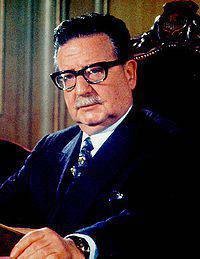 The party was banned and moved to an illegal position. Therefore, for a long time, the Communists worked to support candidates from the Socialist Party of Chile, one of which was Salvador Allende (1908-1973) - a native of a distinguished Chilean family name, a doctor by profession, who became General Secretary of the Socialist Party of Chile in 1942. In 1948, Allende left the Socialist Party because the Socialists supported the law banning the activities of the Communist Party of Chile. El Salvador created its own People’s Socialist Party, but then returned to the Socialist Party, after the People’s Socialist Party supported the candidacy of one of the right-wing generals, Carlos Ibáñez. In the 1952 election, Mr. Salvador Allende, nominated by the Socialist Party with the support of the Communists, won only 5,4% of the vote. However, later, thanks to the active work of the socialists and communists, the popularity of Allende in Chilean society increased significantly. In 1958, the Communist Party of Chile received the opportunity of legal political activity. In the elections that same year, Salvador Allende, who was also supported by the communists, received a significantly larger number of votes than before, although Jorge Alessandri lost the election.
The party was banned and moved to an illegal position. Therefore, for a long time, the Communists worked to support candidates from the Socialist Party of Chile, one of which was Salvador Allende (1908-1973) - a native of a distinguished Chilean family name, a doctor by profession, who became General Secretary of the Socialist Party of Chile in 1942. In 1948, Allende left the Socialist Party because the Socialists supported the law banning the activities of the Communist Party of Chile. El Salvador created its own People’s Socialist Party, but then returned to the Socialist Party, after the People’s Socialist Party supported the candidacy of one of the right-wing generals, Carlos Ibáñez. In the 1952 election, Mr. Salvador Allende, nominated by the Socialist Party with the support of the Communists, won only 5,4% of the vote. However, later, thanks to the active work of the socialists and communists, the popularity of Allende in Chilean society increased significantly. In 1958, the Communist Party of Chile received the opportunity of legal political activity. In the elections that same year, Salvador Allende, who was also supported by the communists, received a significantly larger number of votes than before, although Jorge Alessandri lost the election. Young Victor Hara dedicated his songs, including, to Salvador Allende, whom he considered one of the most important heroes of the struggle for social justice in Chile. At the time, on the left, there were many prominent cultural figures of the country. Thus, a member of the Central Committee of the Communist Party of Chile was the most famous Chilean poet Pablo Neruda (1904-1973). In fact, his name was Ricardo Elieser Nephtali Reyes, and he took the pseudonym Neruda in his youth to avoid conflict with his father, who did not approve of his literary interests. The son of a railway worker, a Chilean and teacher of Jewish origin, Pablo Neruda entered the Pedagogical Institute - a teacher of French, in 1923, in 19 years, published his first collection of poems. In 1927, a very young 23-year-old Neruda was appointed consul of Chile in Burma. Since then, he spent a long time in diplomatic work - he managed to visit the consul in Singapore and Ceylon, in the Dutch East Indies (Indonesia), Argentina and Mexico, and in March 1945 was elected to the Senate of Chile from the northern regions of Antofagasta and Tarapaka. 15 July 1945 Pablo Neruda joined the Communist Party of Chile. After President Gonzalez Videla banned the Communist Party of Chile, Senator Neruda in a public speech called the president an American puppet, after which he was forced to move to an underground position, fearing arrest and imprisonment. Neruda was another hero for Victor Hara. He considered him one of his masterminds. And, like Neruda, ultimately made a choice in favor of the Communist Party. After Victor Hara visited the Soviet Union in 1961 as part of the Kunkumen ensemble, he decided to join the Communist Party of Chile. The trip to Moscow had a tremendous impression on Victor. In a letter to his wife, Joan, he wrote: “... We must learn from the Russians how to live together. They have a spiritual steadfastness that makes them calm, kind and at the same time firm. I would also like to be so, to have convictions and goals that would show me the way. I know it is difficult ... Russians are fantastic people ... They are very open and friendly. Until I met anyone who would have swum to the conquest of space ... ".
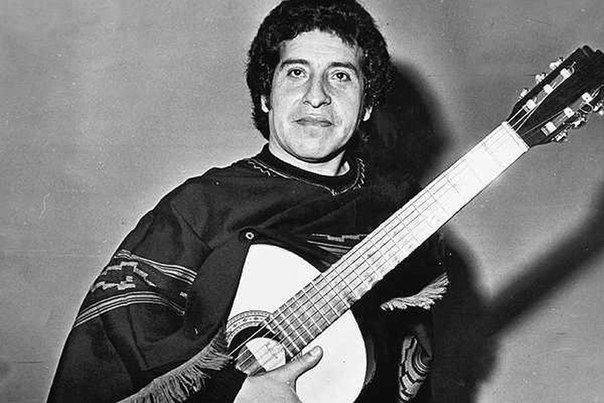
Protest time 1960-x
In the turbulent sixties, the demand for a radical protest against the capitalist system, with which all the other evils of society were associated, from cultural stagnation to discrimination against young people, has increased dramatically in Latin America. In the same Chile, in addition to the Communist Party, left-wing youth radical groups, which appear on the basis of radical student movements, became more active. There was growing dissatisfaction with the Frey government’s policy, which among young people assumed the character of a movement for university reform. In 1967 was Catholic University of Santiago, which was considered the most elite and conservative institution of higher education in Chile, also intensified protest sentiments. Initially, students wanted to play a more significant role in university life, but subsequently the self-government movement acquired more politicized features. The impact of revolutionary Cuba, which became an example for radical groups of the population in all countries of Latin America, also had its effect. Sympathy for the Cuban revolution, for Che Guevara penetrated into the environment of the Chilean students. In March, the 1968 Radically-minded students seized the corpus of the Faculty of Music and Dramatic Art at the University of Chile, sending a telegram of solidarity to the students of Paris, where powerful student performances also took place (later called "Red May" or "Paris May"). However, unlike France, where the leading role in the protest movement of students was played by groups of so-called “new leftists” - radical young people who adhered to an eclectic ideology from a mixture of Maoism, anarchism, Trotskyism, in Chile the student protests were led by the Communist Party. Chilean communists advocated open access to university education for children of working and peasant families, university autonomy, and state non-interference in the internal affairs of university autonomies. In many ways, these requirements were dictated by objective circumstances. In Chile of that time, there was tremendous social polarization, which also influenced the accessibility of higher education for members of the poor. Secondly, the dependence of Chilean higher education on foreign interests, primarily American ones, grew. Through grants and subsidies, the United States sought to subordinate Chilean universities to the interests of serving the American state and corporations. Therefore, although Chilean universities were in demand among students and from other Latin American states, they faced many problems, which the activists of the student movement led by the Communists were trying to solve. At that time, Victor Hara taught at the Theatrical School of the University of Chile and at the same time worked as a director at the Institute of Theater at the University of Chile. That is, he simply could not stay aside from such turbulent political events, considering also the factor that the majority of his students took an active part in the movement for university reform. Victor Hara, along with many colleagues and students, took part in mass protest demonstrations, composed songs that instantly became real hymns of students' struggle for their rights.
In October, 1968, Chilean students managed to achieve the implementation of some of their requirements. The election of a new university leadership was announced, the seized building of the Faculty of Music and Dramatic Art was released by students and returned to daily activities. Simultaneously, the concert of Victor Hara with the ensemble "Kilapayun" was included in the official season of Chilean music. The recognition came to the Hare and at the official level. However, the growing fame carried Victor Hare and new problems. He was attacked by the conservative press, accusing him of communism and striving to undermine the foundations of the existing political order. During a concert in an elite school, he was obstructed by pupils - people from rich families in Chile who sympathized with right-wing political circles. During the period under review, the political situation in Chile remained tense. The popularity of the left forces was growing, which was very disturbing to the conservative part of Chilean society, especially the latifundists and the bourgeoisie. In 1970, the candidacy of Salvador Allende was re-nominated for the presidency of Chile, supported by a broad democratic coalition of socialists, communists and radicals. By the number of votes cast for him, Salvador Allende overtook two of his rivals, but was unable to gain the required absolute majority of votes. According to the law, the candidature of Allende should have been approved or rejected by the congress in this case. After Allende promised the Christian democrats not to violate the principles of democracy, he was also supported by the Christian Democratic Party of Chile.
President Allende and US Resistance
October 24 1970, the year Salvador Allende was officially proclaimed the new president of Chile. His election to this post caused sharp discontent of the right-wing oligarchic circles of Chile and the United States behind them. The United States considered the election of Allende to the presidency of Chile - one of the most economically developed countries in Latin America - as a consequence of strengthening the position of the Soviet Union on the continent. Having come to power, Salvador Allende announced the nationalization of large companies and banks and the implementation of agrarian reform. Allende’s efforts to implement the principles of social justice met with tremendous dissatisfaction on the part of the landowners, who began to slaughter cattle in droves. At the same time, Allende pursued a policy to minimize unemployment and improve the quality of life of the population. The unemployment rate in the country has decreased by almost half, while the cost of living has increased by 329%, and the minimum wage and pensions - by 500%. But such a social policy Allende caused all the great concerns in the United States. Moreover, the new president nationalized copper smelting companies, in which American companies had previously invested large funds. The Americans refused the compensation that the Chilean government agreed to grant them. Soon in the world market prices for copper began to fall, which is one of the key export goods of Chile, on whose sales the state of the Chilean economy depended. Inflation has worsened in the country, the economic situation of the population began to deteriorate. According to Nikolai Leonov, a former employee of the leadership of the KGB of the USSR, “the Americans organized a boycott of Chilean copper, from the sale of which Chile received the main foreign exchange earnings. They froze the Chilean accounts in the banks. Local entrepreneurs began to pump their capital abroad, curtail workplaces in enterprises, create artificial food shortages in the country ”(Op. by: Soldier of Russia - Yuri Drozdov // http://murzim.ru/jenciklopedii/razvedka/22623-prilozheniya-soldat-rossii-yuriy-drozdov.html). Thereby, the USA implemented its tried and tested tactics - the creation of economic problems to an objectionable government of a sovereign country in order to exacerbate the internal political situation in the latter and overthrow the existing system. In addition to artificially worsening the economic situation, the United States supported the anti-government opposition, whose activities destabilized the situation in the country. In Chile, the fascist groups that began the terror against the socialists, communists, trade union workers became more active. Another method to destabilize the situation implemented in Chile along the lines of other Latin American countries was the organization of “marches of empty pans”. For these marches, women were recruited either from the families of fascists and conservatives, or from the marginal environment, ready to go for demonstration with empty pans, symbolizing the famine that the socialist government brought to the people.
With the coming to power of Salvador Allende, Victor Hara became almost the official singer of the new Chile. His concerts were more frequent, and in 1972 he went on a visit to Cuba. Returning to his homeland, he joined the social and political life of the country with even more enthusiasm - Victor really liked what Fidel Castro did with Cuba. There were social and economic gains of the revolution, cultural progress. However, the situation in Chile itself continued to escalate. In October, the Kennecott Copper Corporation promoted the imposition of an international embargo on Chilean copper, after which Chilean ships began to be “arrested” in European ports. The Chilean economy suffered huge losses that were aggravated by the strike announced by the truck owners syndicate. The speech of entrepreneurs was also inspired by pro-American forces and set a goal to further undermine the authority of the Allende government in the eyes of Chilean citizens. At this time, mobilization of left and trade union activists took place throughout the country. Volunteers, among whom was Victor Khara, participated in the unloading of trains with foodstuffs, which arrived in the cities, deprived of food due to the strike of truck owners. Victor Hara and his ensemble in this difficult time for the country played a big role in encouraging the masses, supporting activists of left parties and trade unions, ordinary Chileans, ridiculing right-wing conservatives and “marches of pots”.
The unstable political situation in the country demanded non-standard measures from Salvador Allende. In November 1972, a new Chilean government was formed, which included three senior Chilean military officers. General Carlos Prats, formerly Army Commander, became Minister of the Interior, Rear Admiral Ismael Huerta Minister of Public Works, and Brigadier General aviation Claudio Sepulveda - Minister of Mining of Chile. By attracting reputable generals, Allende hoped to achieve the support of the armed forces, since only they were able to maintain political stability in the country and protect power from pro-American ultra-right organizations and criminal groups controlled by oligarchs and latifundists. Meanwhile, the latter almost openly began preparing a speech against the government, as a result of which, with the organizational, financial and informational support of the United States and its satellites, the country's legitimate president Salvador Allende was to be overthrown. Right-wing organizations by the time under review had about 30 armed militants, which exceeded the size of the Chilean regular army, which amounted to 000 military personnel. In parallel, libelous charges were brought against Allende. The Chilean Chamber of Deputies accused the president of authoritarianism, neglect of court decisions, attempted freedom of speech, arrests and torture of opponents, attempts on property owners, the introduction of Marxism in educational programs. The country actually launched a civil war against the current government. Up to 25 terrorist attacks took place every day. Right-wing radicals from the Patria and Libertad organization (Fatherland and Liberty) blew up bridges, railways and power lines). At the same time, left-wing radicals also intensified, apparently who received tasks from the same center. Only they, unlike the right, attacked banks and killed police and military personnel. During the year, 000 bridges, roads and railways were destroyed, power lines, oil pipelines and power plants were blown up. The total cost of damage suffered by extremists amounted to 30% of the budget of Chile.
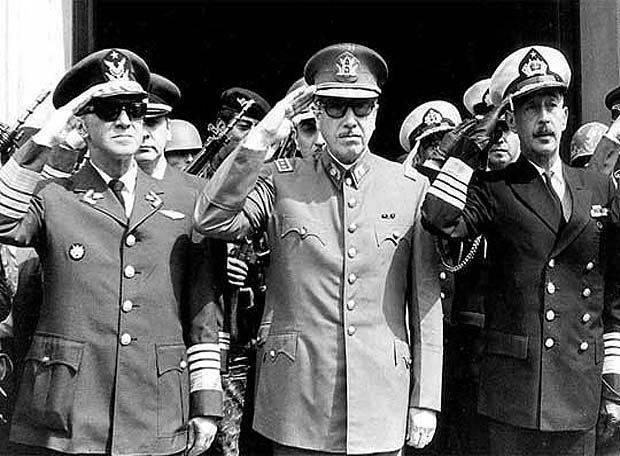
Military coup. Bloody kill at the stadium
On the night of September 10-11, 1973, a mutiny began on the ships of the Chilean Navy, which participated in joint Chilean-American exercises off the coast of the country. Several hundred Chilean officers and sailors who supported the Allende government were killed and their bodies dumped at sea. After that, on September 11, naval ships fired at the port of Valparaiso, after which they landed a landing force and captured the city. Around 6.30 in the morning, a military rebellion began in the capital of Santiago. The military captured the television center, and the right-wing radio stations broadcast a statement about the change of power and the creation of a military junta, which included the commander of the Chilean land forces, General Augusto Pinochet, the commander of the Navy, Admiral Jose Merino, the commander of the Air Force, General Gustavo Lee and acting Director of the Carabinieri Corps (approx. - Chilean counterpart of internal troops) General Cesar Mendoza. The Portales and Corporation corporations controlled by the Allende government were bombed by the Chilean Air Force. At 9.15 a.m., coup troops led by General Javier Palacios launched an assault on the La Moneda presidential palace. The palace was protected by about forty people, and the shelling was Tanks and air force aviation. By 14.20 p.m. the building of the presidential palace was seized, President Salvador Allende was killed. In parallel with the seizure of power, the military junta launched real terror against supporters of the Allende government and leftist forces in general. The country began mass arrests and killings without trial. A huge concentration camp was created at the Santiago National Stadium, where 40 leftist activists and just random citizens captured by junta supporters were placed. Men were kept on the field and in the stands of the stadium, women were kept in the locker rooms of the swimming pool, and the velodrome was used for interrogations. Among those left at the stadium was the legendary singer Viktor Hara. Once, in 000, Hara performed at the stadium and won the festival of the “New Chilean Song”. Now he, who did not expect such a fate for himself, had to be a prisoner of a concentration camp. The right-wingers hated Victor Haru as a singer of the Chilean communist movement, so they tortured him brutally and for a long time. Electric current was passed through the singer’s body, they hit him in the face with a pistol, broke his fingers, and then they shattered both hands so that he could never play the guitar. The soldiers who captured the singer showed him as the main trophy - the "communist voice." However, Hara was able to dictate to colleagues in misfortune a poem: “President Allende’s blood is beating harder than bombs and bullets. Our fists will strike again. ”
On Sunday morning, 16, September, 1973, residents of the village of San Miguel, through which the road from the stadium passed, found six corpses with disfigured faces, riddled with machine gun bullets. Passers-by looked at their faces for a long time, trying to identify one of their acquaintances, until a woman found out in one of the dead Victor Haru. While the villagers were thinking what to do with the corpses, there was a noise of a car pulling up. Passers-by hid in fear, while men in civilian clothes threw the corpses into the car and drove away. Once again, Victor Haru was identified in the morgue. When Pablo Neruda found out about the death of Hara, he exclaimed: “God, this is the same thing as killing a nightingale!” Later it became known that Victor Haru was shot 15 September 1973 g. 30 machine gun bullets hit the body of the singer. Hara's bones were broken in thirty places.
The executioner went away from retribution
36 years passed after the murder of the singer when former soldier Jose Paredes Marquez was charged with a crime in 2009. A little later, it became known that tortured Victor Haru, Lieutenant Edwin Dimter Bianchi. He called himself "The Prince", but his colleagues gave him a more appropriate nickname - "Mad Dimter".
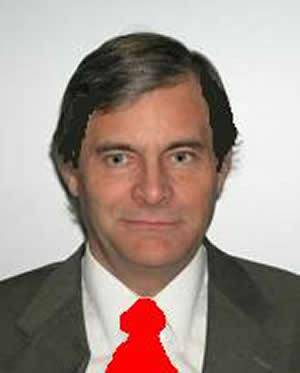 Dimter Bianchi came from a family of Swiss Germans who emigrated to Chile. He underwent military training in Panama - in the “School of the Americas”, where US CIA specialists trained loyal Americans to punitive military dictatorships in Latin America. 29 June The 1973 of Bianchi participated in an attempted military coup prevented by Chile’s government forces, after which he was arrested and imprisoned. He was released from prison on the day of the new 11 coup in September of 1973. Putchista, believing that Dimter, who spent several months in prison, will recoup the unfortunate leftist activists, sent him to investigate in a concentration camp at the Chile stadium. Those of the victims of the “Prince” who were lucky enough to survive remember him as a mentally unbalanced person. Lieutenant Bianchi climbed to the upper gallery of the stadium and laughed out loud when the detainees were beaten down. Bravuya, he even took off his helmet and dark glasses, although more intelligent executioners preferred to hide their faces - they knew that politics in Latin America was unstable and it was possible that sooner or later they would have to be punished for their actions. As a result, Dimter Bianchi is well remembered. Lieutenant Bianchi, according to eyewitness accounts, personally kicked and fired the pistol in the face of Victor Haru.
Dimter Bianchi came from a family of Swiss Germans who emigrated to Chile. He underwent military training in Panama - in the “School of the Americas”, where US CIA specialists trained loyal Americans to punitive military dictatorships in Latin America. 29 June The 1973 of Bianchi participated in an attempted military coup prevented by Chile’s government forces, after which he was arrested and imprisoned. He was released from prison on the day of the new 11 coup in September of 1973. Putchista, believing that Dimter, who spent several months in prison, will recoup the unfortunate leftist activists, sent him to investigate in a concentration camp at the Chile stadium. Those of the victims of the “Prince” who were lucky enough to survive remember him as a mentally unbalanced person. Lieutenant Bianchi climbed to the upper gallery of the stadium and laughed out loud when the detainees were beaten down. Bravuya, he even took off his helmet and dark glasses, although more intelligent executioners preferred to hide their faces - they knew that politics in Latin America was unstable and it was possible that sooner or later they would have to be punished for their actions. As a result, Dimter Bianchi is well remembered. Lieutenant Bianchi, according to eyewitness accounts, personally kicked and fired the pistol in the face of Victor Haru. After Viktor Hara's body was exhumed in June 2009, it turned out that his death was not caused by machine gun shots fired by Private Jose Paredes, but by a pistol shot to the head - that is, Haru shot, most likely, personally Lieutenant Dimter Bianchi. But Dimter Bianchi did not bear the deserved punishment. At the end of 1976, Mr. Bianchi retired from the armed forces, received an auditor qualification and worked in the Ministry of Labor of Chile, and now he was most likely retired - in 2015, he turned 65 years. When, recognizing the workplace of Bianchi, civilian activists came with a portrait of Victor Hara, he hit one of them and ran down the stairs to the service building.
Information